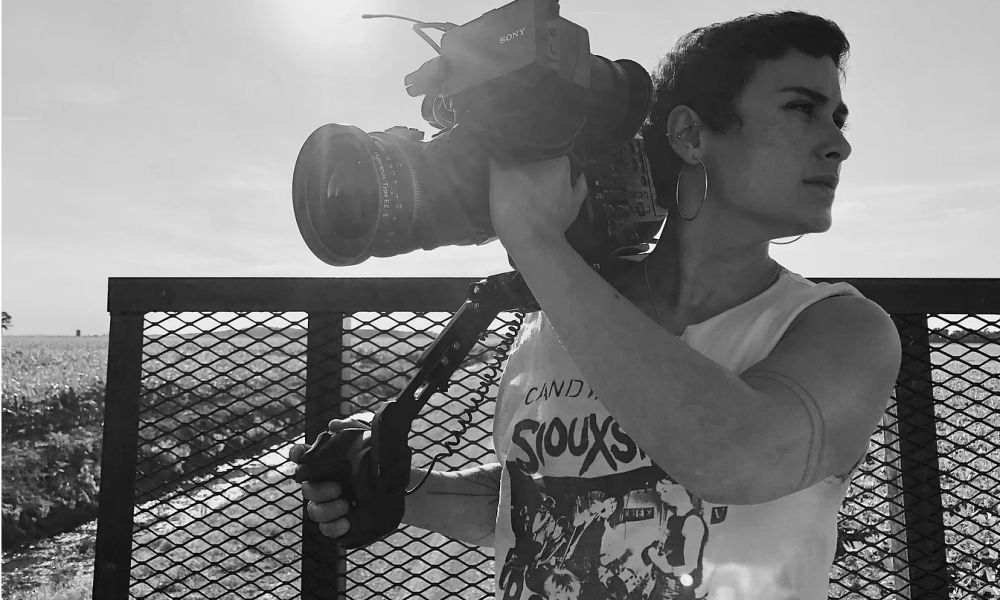

Today we’d like to introduce you to Lauren Guiteras.
Every artist has a unique story. Can you briefly walk us through yours?
I grew up in South Florida and wanted to act when I was a teenager. I always had an interest in filmmaking in general, but I didn’t know what a cinematographer was until I was probably about 16 or 17.
My mother insists that she saw me taking pictures of shadows in the backyard when I was in middle school, though I think she is generously trying to fabricate an origin story for me because I have no recollection of this. She has never produced the evidence, in any case.
I always assumed that the director was the person behind the lens because the most visible/famous ones are often photographed operating, even though that’s not the norm in reality. Once I learned that there was a person specifically dedicated to the camera and designing the visual language of a movie, that role became fascinating to me and made me realize that the director was just one step too removed from the craft I was interested in.
In college, I began learning how to shoot on Super 16 but mostly stumbled my way through music videos on DSLRs, making my own frame lines on tiny displays with electrical tape. The trust of two directors at my school, Nina Rogers and Laurel Cohen, was invaluable to my creative and personal development. Had they not shared their projects with me, I’m pretty certain I would have quit filmmaking before I even started. I was extremely intimidated by the charlatan “cameramen” of my cohort. I did not believe that I could shoot until Laurel and Nina said that I should. I didn’t believe it for some time after, really, but it was enough to get me started.
After a few pure strokes of luck and considerable support from my parents, I got into and graduated from AFI’s cinematography program. I feel that the barriers to entry into the film industry are important to acknowledge. I could afford to work for free for at least a year before AFI and pay my rent during grad school because my parents could afford to help me through it. Anyone who wants the career that I am attempting to build must either save their own money for years or have access to generational wealth. Or win the literal lottery. There are no exceptions that I am aware of.
Because of the financial support in my life, I graduated from AFI in 2017 and have made my own living as a freelancer since then. I love dark comedy, science fiction, and horror, and hope to distinguish my career as a DP with an affinity for these genres. That said, I’d love to shoot a film of any kind as long as the writing and performances are strong. Nothing else can shine without that foundation.
Please tell us about your art.
I shoot because I typically feel happy and purposeful when I am on set. I think if audiences take anything away from what I do, it’s only because it has contributed to something that has become more than the sum of its parts.
If there’s something I want people to know about cinematography, it’s that its success is predicated above all else on: (1) an understanding of the script, and (2), the tireless work of a camera and G&E crew. This is not hyperbole or flattery. “Tireless” is quite literal in a world of 13, 14, sometimes 15 hour days for weeks on end.
I would also like to say that in my brief experience, cinematography, like any other commercial art form, is subject to the vagaries of its financiers. Even the most accomplished, daring, and innovative cinematographers must bow to certain conventions and expectations when they shoot multimillion dollar movies. I’m nowhere close to shooting a Big Hollywood Movie, but I do hope to one day shoot films that will reach large audiences.
The character of pop cinema is not unlike that of pop music: frequently brilliant and occasionally subversive, perhaps more impactful than highbrow art could ever possibly be on the basis of circulation alone. But as a person who hopes to hopes to contribute to pop culture in my own small way, I am wary of the control I will ultimately have over my “art.” I just hope that one day I will shoot a feature that I would really love to watch, that large groups of people would actually see, and into which I could seamlessly blend lighting and camera placement. Again, I don’t believe that these aspects of filmmaking can respectfully eclipse performance or writing.
Do you have any advice for other artists? Any lessons you wished you learned earlier?
Freewrite in the morning and watch sitcoms in the evening.
How or where can people see your work? How can people support your work?
I post a lot of work on my Instagram, @laurenguiteras.
Contact Info:
- Website: www.laurenguiteras.com
- Phone: 9543262003
- Email: [email protected]
- Instagram: @laurenguiteras







 Image Credit:
Image Credit:
The photo of me is by Favienne Howsepian.
Getting in touch: VoyageLA is built on recommendations from the community; it’s how we uncover hidden gems, so if you know someone who deserves recognition please let us know here.



















